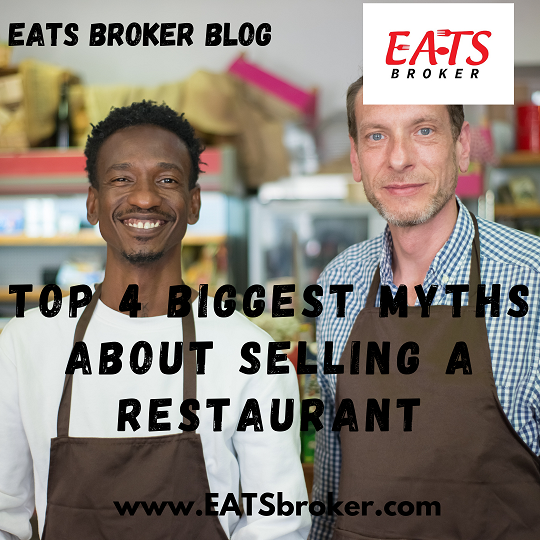Many restaurant owners share the Top 4 Biggest Myths about selling a restaurant. Selling a restaurant is much different from selling other businesses, and many restaurant owners will only sell a restaurant once in their lifetime.
When it’s time to sell a restaurant, a large percentage of restaurant owners have common misperceptions about the process.
Dallas, Texas Restaurant Broker Dominique Maddox says, “There are NO guarantees when selling a restaurant, and every deal has unique stipulations and obstacles that somebody must overcome. Restaurant owners that believe common myths about selling a restaurant are commonly disappointed”.
The 5 Biggest Myths about selling a restaurant are:
- Every deal is the same: Restaurant owners that have bought or sold a restaurant in the past sometimes believe every deal process is the same, and this belief is far from the truth. Each Asset Purchase Agreement has several small details that make a big difference.
Things to consider in each deal:
-Selling a profitable restaurant or an Asset Sale
-Selling a Franchise or non-franchise
-The buyer’s profile
-The landlord approval process
-The Franchise approval process
-Bank lending required or cash deal
-E-2 investor requirements
-Closing Attorney involved
-PPP or EIDL payments owed
-Sales Tax Filings
-Equipment repair requirements
- I will receive my asking price: When selling a restaurant, everything is negotiable, but the rent amount is owed to the landlord. The negotiation process between the buyer and the seller will determine the terms of the deal.
Restaurant owners can list a restaurant for sale, stating they want to recoup their equipment purchase price, build-out cost, or loan payoff balance, only to be disappointed. The market will determine the price of your restaurant.
Cash buyers are usually more aggressive in their offer price. Restaurant owners should expect offers at least 10% lower or more than the asking price.
- Time to sell a restaurant: The average time to sell a restaurant is 150-165 days, but this is only an average. Only 20%-30%of the restaurants listed will sell to a new buyer, and most restaurants for sale will sit on the market and never sell.
Only 2%-5% of the buyers looking to buy a restaurant will buy. Some deals are more like a slow cooker instead of a pressure cooker. Restaurant Sellers want a quick sale, while some restaurant buyers are not ready for quick closing.
- The Landlord is your partner: When dealing with a lease assignment approval from the landlord, some restaurant owners think the process is simple. Most owners have not reviewed the lease document they signed when opening the restaurant, and owners usually do not know what requirements are needed for lease assignment approval.
The Golden Rule when dealing with a landlord is that they are not your friend, and the landlord is looking out for their best interest in collecting future rent. If the landlord has a well-qualified restaurant owner as a lease guarantor, why would they approve a lease assignment for a questionable potential tenant?
The landlord can decide if a deal will make it to the closing table. Should the restaurant owner feel comfortable only in leases that don’t require landlord consent or have written auto-approval language for franchises.
Selling a restaurant can be a complex process. Hiring the right Restaurant Broker and understanding the selling process can make all the difference.
For more information on the restaurant market and other available consulting services or a complimentary restaurant valuation, contact Dallas Restaurant Broker Dominique Maddox at 404-993-4448 or email at [email protected]. Visit our website at www.EATSbroker.com


